
“Tokenization is ushering in the next generation of commerce,” said Arun Ghosh, KPMG US Blockchain Leader. “It provides inspiring new ways to classify value, either by creating new assets or reimagining traditional ones, sustained with the security and transparency of blockchain. Businesses that take advantage of tokenization can open the door to entirely new process improvements, revenue streams and customer engagement opportunities.”

Challenges and opportunities for tokenisation
If tokens prove to be simple to use, the survey suggests that 79% of Americans would be more willing to use them. The inference is that, if intuitive, engaging and simple token experiences exist, businesses might access loyalty-boosting advantages for consumer brands.
However, according to the survey, the potential is vast in those industries where consumers already express high levels of loyalty. For instance, when asked about loyalty to products/services across industries, consumers reported high levels of allegiance to:
- banks and credit card companies (87%)
- restaurants/fast food/coffee shops (86%)
- electronics companies (81%)
- media/telecom companies (79%).
The report finds that brands in these industries – as well as those others willing to crack the code on developing token programs for use in a wide range of applications – will find a willing, eager and accepting market.
Strategic findings, according to KPMG
The findings also highlight:
- the strategic business value of blockchain infrastructure
- the opportunities for businesses to leverage blockchain technology for transparent, immutable and frictionless transactions.
While just one-third of consumers described themselves as highly familiar with this view of blockchain-based definition of tokens:
- 63% (the majority of that group, 63%) perceive tokens as an easy form of payment
- 55% believe tokens will enable them to make better use of loyalty reward points.
Loyalty programs are already in the process of redefinition, according to KPMG, because of tokenization. Tokens present an entry point for businesses to introduce broader tokenisation:
- 82% of consumers are willing to use tokens as part of an existing loyalty program
- 81% would trust the use of tokens more readily if they are already participating in a company’s loyalty program.
“By using tokenization, companies can develop new forms of value exchange within an existing network, such as allowing consumers to use loyalty points for purchases with different merchants,” continued Ghosh. “Not only can this create more engaging customer experiences, it offers significant operational efficiencies by accelerating the transfer of value.”
Enterprise Times: what does this mean
KPMG asserts, in its Report, that “Tokens are enabling new ways to purchase products and services, enhance customer experiences, and strengthen customer trust and brand loyalty, in addition to numerous value-driving business initiatives“. This is a brave new picture.
But, but, but… Until the likes of the BIS changes its mind about tokens and cryptocurrencies and digital wallets feel at least as safe as fiat money in the bank, Enterprise Times does not (yet believe). Furthermore, this is a US-based survey. Whether its conclusions apply elsewhere will need additional research.


























